This Was My Climate Week That Was
I go “long form” with thoughts triggered by London Climate Action Week, 2025
This essay is dedicated to the memory of Andrew Kassoy, the B-Lab co-founder who did so much to promote both the triple bottom line and the wider cause of corporate sustainability.
“There are decades where nothing happens,” Lenin once observed. “And there are weeks where decades happen.” His words came to mind as I worked my way through a minuscule proportion of the 700-plus events held as part of the 2025 edition of London Climate Action Week in recent days.
Along the way, I celebrated my seventy-sixth birthday on Monday 23rd by helping to launch the Volans “Defying the Odds” series of events, our week-long contribution to the Climate Action Week, convened in close partnership with The Crown Estate. Individual sessions were also co-evolved with partners like The Skoll Centre at Oxford University’s Saïd Business School
As our six sessions in Somerset House enticed in hundreds of the best people in our field, my brain did its usual thing of going simultaneously into overdrive and solid state—trying to make sense of all the things that it was hearing, or at least that I thought I was hearing. On reflection, the four overarching themes that eventually surfaced, at least for me, were:
1. Now it’s (really) political
2. The Great Reset has begun
3. Nature wants a seat at the boardroom table
4. London is back as the World Capital of Sustainability
Before we get into all of that, however, here is an initial quintet of images to give some sense of our venue, the spirit of the occasion and the nature of the events. Throughout, the conversations were very much in the Volans mode of deep listening in service of deeper understanding, though I sometimes wondered if our use of the couches for a series of modified “fishbowl” sessions wasn’t encouraging some people to treat it all as a free form of group therapy!

The original idea of the LCAW sessions came from—and was developed by—our CEO, Louise Kjellerup Roper. She and Richard Roberts, our Inquiry Lead, compered the sessions. Each was kicked off with three provocations, although as Louise noted—pretty much any of the people in our audiences could have served as provocateurs.
The response was brilliant. As one highly experienced participant put it: “Had a fabulous time and am planning to rejoin salon this afternoon too. [The Volans] team are so good at creating the warm, open armed welcome to inspire deep discussion.” Another participant embraced the sessions as a “a space for not knowing,” for emergence.
So here are my four main takeaways—and a concluding set of personal commitments.
1. Now it’s (really) political
I have been arguing for years that our change agenda Is in the process of becoming both political and politicized. This week, typical comments emanating from the sofas were far from comfortable:
· “We are in the fight of our lives.”
· “Why are we not all running around screaming?
· “We are hostages in a dying system.”
On a more positive note, we also heard comments along the lines of that golden oldie:
· “Never waste a good crisis!”
In the background, the Trump regime was bombing nuclear facilities in Iran; NATO member countries were agreeing to boost defence spending at the expense of aid, welfare and sustainability; the Church of England was announcing that it would prepare all its parishes to support the country in a future war; and Wall Street stocks, in the form of the S&P 500 share index, were enjoying a spectacular rebound—touching new heights. Maybe it’s time to think of getting out of stocks and shares?
But as the news cycle churned through it was hard to miss the tsunami of news about the very mixed reaction of Venetians to the takeover of the city by the Bezos octopus, as the Amazon founder pulled his undoubtedly impressive longstanding squeeze, Lauren Sanchez, deeper into his tentacular embrace.
Indeed, it was hard to keep a 1904 cartoon by Udo Kepler out of one’s mind as the Week progressed:
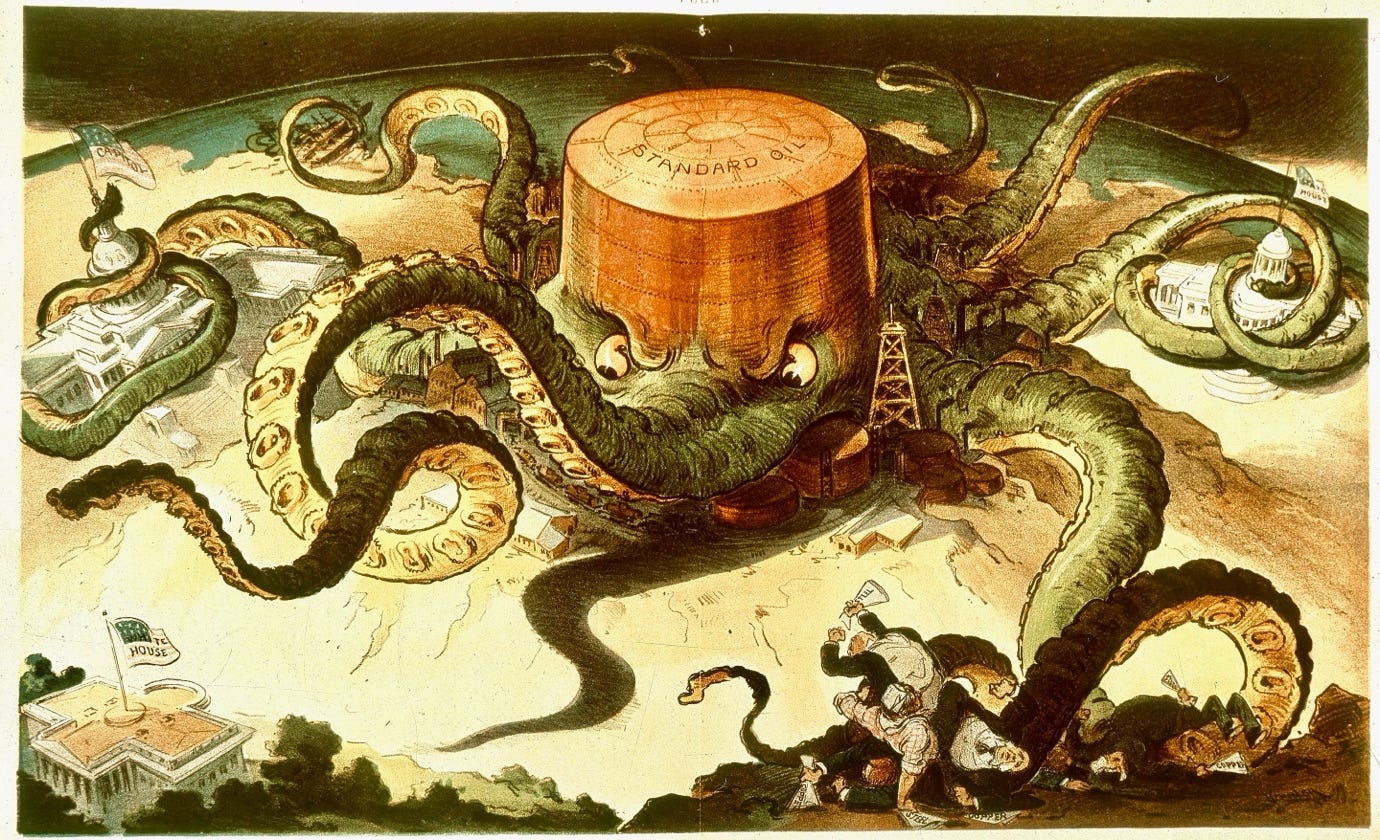
Interestingly, too, the tentacles of the increasingly embattled fossil fuels industry were never far from our thoughts in both plenary and breakout sessions. It is hard to avoid the conclusion that we are living in a new “Gilded Age,” with billionaires not just collectively making trillions but, as in the case of Elon Musk, trying to take chainsaws to bring America’s federal government to its knees.
Whereas the extreme wealth was once driven by engines on rails, however, today it’s more a question of digital engines. Hence the growing power of people like Bezos, Musk or Zuckerberg. And the adverse impact of what people like Musk have been doing, particularly in destroying key elements of the US aid sector, is an early warning of what’s ahead.
So, what will future generations make of his social media post a few months back braying that: “We spent the weekend feeding USAID into the woodchipper. Could [sic] gone to some great parties. Did that instead.” In May, modelling by Boston University suggested that as many as 300,000 people might have died already because of the DOGE cuts. I wonder how that feels, Mr Musk?
The impact of all this on Tesla has been a case study in the new politics of business. Tesla is suffering badly at a time when the EV competition is building energetically. On Saturday, 25th June, for example, the Financial Times reported that the Beijing-based smartphone maker Xiaomi was claiming that it had received 200,00 pre-orders for its latest EVs in just three minutes—posing a threat not to just Tesla but also to Chinese brands like BYD.
Again, the times increasingly mean that, like it or not, we are all in the fight of our lives. And that was one reason why when some LCAW discussions subsided into injunctions to love thy neighbour, with the “Jeff in Venice” jamboree rolling on in the background, I found myself wondering what planet some of us are on?
At one point, Mike Berners-Lee asked one of our audiences whether we genuinely feel we can dig ourselves out of this hole by empathizing with the Likes of Musk and Trump?
2. The Great Reset is under way
Love or loathe the autocrats, who would turn the world into a wealth machine benefitting themselves and their families—did you see the announcement that son-of-Donald Eric Trump now wants to be President, too?—wealth divides are increasingly distorting our economies and societies.
That’s why yet another book called Abundance is now on my reading list this coming week. It asks the question why we are so singularly failing to build a better future. Its conclusion:
... our problems today are not the results of yesteryear’s villains. Rather, one generation’s solutions have become the next generation’s problems. Rules and regulations designed to solve the problems of the 1970s often prevent urban-density and green-energy projects that would help solve the problems of the 2020s. Laws meant to ensure that government considers the consequences of its actions have made it too difficult for government to act consequentially. In the last few decades, our capacity to see problems has sharpened while our ability to solve them has diminished.
I carried this systemic line of questioning into speeches I did through the week, including one I did virtually for the Value Balancing Alliance annual conference in Frankfurt. My message was built around the notion that the Trump regime is already doing system change, taking apart a global order that was forged in the wake of WW2. But this chainsaw approach is about as far as it would be possible to get from anything we had in mind when we set up Volans back in 2008.
One part of the coming “Great Reset” must be to recognize that our change agenda has been politicized. As a result, we must learn how to do the politics.
In our second session on Thursday, 26th June, run by Richard Roberts, we focused on the challenge of “Rethinking Corporate Advocacy in a Fracturing World.” In this context, we asked, how might business come together to show a unified front, advocating for the change we need? For insights into what we are doing in this space, take a look here.
Initially, the Reset involves organizations adapting to the simultaneous assault on their agendas, mindsets and business models from the Trump Ascendancy and, from a different direction—even if AI barons have often backed Trump—AI.
Such challenges were very much on our mind when we did a virtual meeting of the EcoVadis Scientific Committee on Wednesday, 25th June.
Even more interesting, though, was the work I did through the Week with members of the GlobeScan and ERM Sustainability Institute teams on our joint “Sustainability At A Crossroads” survey. For an insight into the full results, please join us on 15th July, when we will be doing a first-full-reveal webinar.
But here’s a “sneak peek” into one of the findings that I found mind-bendingly interesting. During one of our “Defying the Odds” sessions, Amy Clarke of Tribe Impact Capital wondered aloud whether the “Invisible Hand” of capitalism has lost its grip? Well, the opinion of our 800-plus survey respondents from 65 countries shows clearly that the sustainability industry suspects that it is at real risk of losing its own grip on the future.
As the diagram below reveals, over 90% of respondents conclude that the sustainability agenda now needs a refresh—with no less than 56% saying that we need radical change.
And that is now the context in which I see the wide array of challenges facing the global change sector—and, frankly, it is also the context for the next stage in the evolution of my own agenda and that of our small change agency, Volans.
How do you personally feel about the current status of the sustainability agenda?
While it was wonderful to hear Sir David King praising the work we do at a dinner Volans hosted in Covent Garden on Thursday 26th, I genuinely believe we are only just getting to the end of the beginning in all of this. The challenge is not simply to reinvent our agenda but to invent ourselves and our platforms.
In hindsight, the exchange that sticks out most clearly in my mind from the Volans session came when Indy Johar of Dark Matter Labs declared that “sustainability is dead.” I respect Indy profoundly—and if we stick with the incumbent definitions of sustainability, I fear that he will prove to have been on the money.
But then, speaking from the sofas, Pavan Sukhdev of GIST Impact countered by saying that sustainability has scarcely been tried yet—indeed that you might argue that it has not yet been properly birthed.
The challenges ahead of us are generational and were nicely captured by Pillita Cark in the Saturday, 28thJune edition of the FT Weekend Magazine—in a long form essay called “Meltdown: How climate shocks could trigger wider market turmoil.” It’s behind a paywall but get read it if you can.
3. The role of London
One of my favourite big picture thinkers served as a provocateur at our final “Big Picture” session on Friday, 27th June. Dr Angela Wilkinson is Secretary-General and CEO of the World Energy Council, whose work I covered just over a year ago in an earlier post in this series.
She argued that too much of our thinking about the future involves looking in the rear-view mirror. Indeed, I highly recommend taking a look at the latest WEC scenarios, Rocks and Rivers.
The scope of the political challenges ahead was dramatically outlined by another old friend of mine, Tom Burke. He is a former director of Friends of the Earth, the Green Alliance and SustainAbility, a special advisor to three successive UK secretaries of state for the environment, and a former chairman of the consultancy E3G. Their mission is to “win the politics of climate”—and they first proposed the idea of London Climate Action Week to the then Mayor of London. That must now be in everyone’s priorities.
At times, I was struck by the sheer number of comms, media and marketing people in LCAW sessions. I don’t doubt that we need to communicate way better—and Cathy Runciman of Brian Eno’s EarthPercent foundation joined us in several sessions. I love what they are trying to do with the music industry—and was struck that Louis VI, who played at the Climate Cocktails Club event, is one of the artists involved in EarthPercent.
One of his messages: “Rewild Yourself.”
But even the most sophisticated comms will only get us so far. We also must engage—and rewild—economists, policymakers, scientists, technologists, troublemakers and so endlessly on. Everyone who shapes our politics and markets.
In that context, our city’s extraordinary convening power was underscored repeatedly for me by the sheer number of people I bumped into the streets, stations and at events. At the Reset Connect event on Monday, 23rd June, for example, I found myself in deep conversation with Sir Andrew Steer—who until recently ran the Bezos Earth Fund—and Chris Griggs, who chairs Britain’s National Wealth Fund.
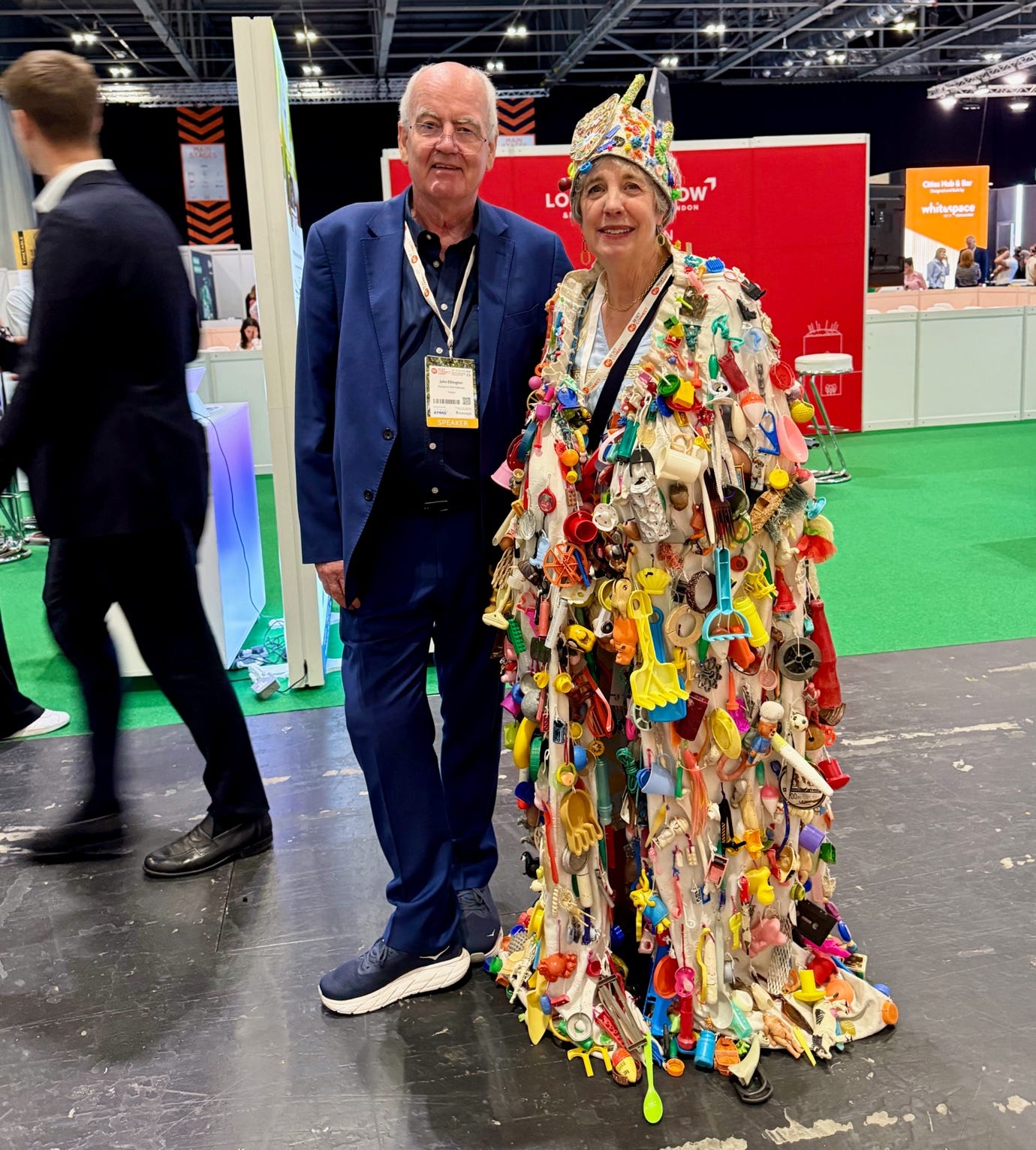
Among the city’s real insurgents, I sat next to Dr Ehab Sayed, Chief Evolution Officer at Biohm. I was already due to visit them in this great city of our next month, which is why I invited him, but I truly can’t wait to hear more about their work on biomimetic biotechnologies.
Among other entrepreneurial insurgents I met were the founders of Subsee.ai, brought along to one of the receptions Volans hosted on the Somerset House terrace, overlooking the Thames, by a longstanding friend and colleague from sustainability days, Fran van Dijk. Their aim: to create tomorrow’s “intelligent ocean.”
An additional delight of the Week was doing book signing sessions both at Reset Connect and Somerset House, featuring Tickling Sharks—helped by Evgenia Xilas of the Volans team. As ever, I talked in some depth to everyone who bought a book, providing wonderful opportunities to take the wider pulse.
And one thing that hit me yet again was how many of these people mentioned having read earlier books of mine at critical points in their careers. One young woman I met at Reset Connect who works for a Dubai-based company said that she had been powerfully influences by our 1992 book Holidays That Don’t Cost the Earth. And my friend Eylül Kiliç from CNBC in Türkiye, brought a copy of 1990’s A Year in the Greenhouse, which she had stumbled across in an Istanbul bookshop.
But the books that were most mentioned were 1997’s Cannibals With Forks, which a number of people recalled was a set book in their university courses, and 2020’s Green Swans—in which I first outlined my take on the emerging regenerative capitalism agenda.
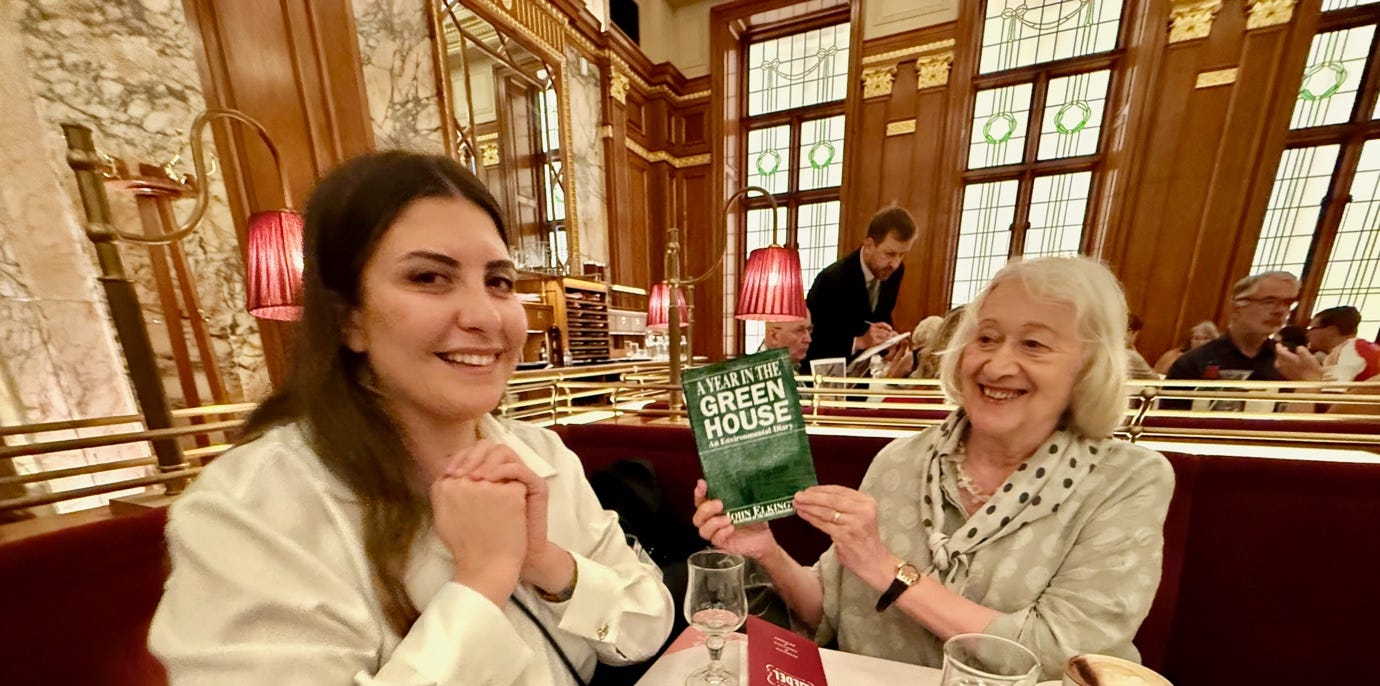
As the Week evolved, I played my Chief Pollinator role to the hilt. On Tuesday, 24th June, for example, I went to a Google nightcap on AI and sustainable development at the Conduit Club. Among those I spoke to were Adam Elman (Head of Sustainability for EMEA) and Antonia Gawels (Global Head of Sustainability & Partnerships), who used to work at SustainAbility back in the day, plus the company’s Chief Sustainability Officer, Kate Brandt. And I left with an invitation to come back to talk to leading team members on the latest developments with Google Earth.
Another illustration of how the London climate solutions ecosystem is evolving involved a tour of the city’s old County Hall—now a sustainability incubator and hub called Sustainable Ventures, the “home of climate tech.” Elaine, Eylül and I were taken around by Simon Brown, Corporate Innovation Partner, ahead of my “Reimagination Radicals” session at the Climate Cocktail Club.

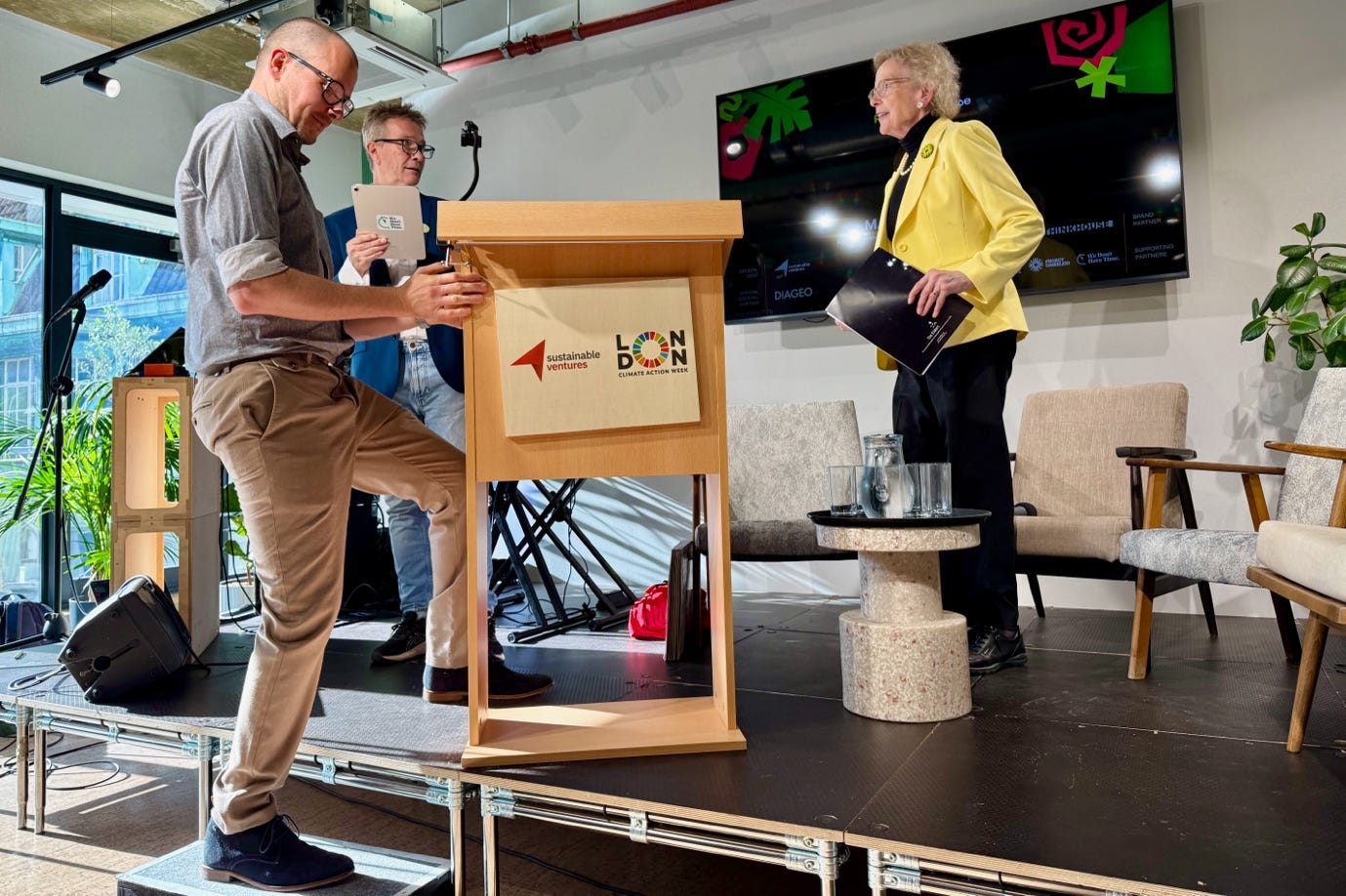
After a barnstorming speech by Mary Robinson, the former Irish President and former Chair of The Elders, the 81-year-old danced off down the aisle, the length of the conference room, and I then did a fireside chat with Nick Nuttall, who I first knew when he was environment and technology correspondent for The Times from 1989.
But Mary’s words rang on in my brain long after, among them it is “no longer sufficient to do what we have been doing.” Overall, a great audience response—and at the end I was given a Trump-red “Make Science Great Again” cap by We Don’t Have Time. Owing to the risk of assassination and abuse, I shan’t be wearing it any time soon—though I imagine we might find a slot for it in Somerset House.

Still, London is very far from being alone in the climate and sustainability space. Indeed, our Somerset House sessions hosted a significant number of key people from Brazil. One of them, Marcello Behar (see below) sat next to me during our Covent Garden dinner—and I can’t wait to discover more about the work he is doing ahead of COP30, to be held in Belem, Brazil, on the bioeconomy.
Like my longstanding friend and colleague Char Love, who recently helped guide Louise and I around Amazonia, I confess that I adore the spirit of these people! That said, I may have ruffled some Brazilian feathers when I did a virtual interview from the 150th anniversary issue of the daily newspaper Estado—and, in answer to a question about whether Brazil should exploit new fossil fuel reserves in Amazonia.
My answer was that, if the highest social and environmental standards are imposed and observed, and a significant share of the profits go back into supporting the emerging bioeconomy, I would support a period of continued extraction. That said, I know that this view will now be widely shared across the regenerative economy.
4. Nature demands a seat at the boardroom table
One longstanding friend, Leena Al Olaimy, was among those who came in furthest for the Volans sessions, in her case from Bahrein. And one of the subjects she and I kept coming back to during the Week was the question of how nature is best brought into the business world and financial decision-making.
This is a theme I am wrestling with as I evolve my latest book, now provisionally titled: The Invisible Paw: How To Handle Nature’s Bottom Line.
My final exchange with Leena, after the last Volans session had wound down and the sofas were waiting to migrate back upstairs to our offices, was in the company of venture capitalist Ed Thorne, a Partner at Sand River. They are dedicated to regenerative investment, noting:
We believe the transition to an economy that values, protects and restores nature is the most significant investment opportunity of our era. It means transforming industries from extraction to regeneration
So, the theme of bringing nature into economics, our economies, markets and businesses will be a leitmotif in my future work. And Sand River are among the new connections made this week which I plan to follow up with through the summer.
But there must be a playful side to all this—and, as if I needed a reminder, a runaway highlight of the week for me was my encounter with The Herds. As they explain:
The Herds unites leading artists and organisations committed to driving change. Key stops include Kinshasa, Lagos, Dakar, Marrakesh, Casablanca, Madrid, Barcelona, Marseille, Arles, Paris, Venice, Manchester, London, Aarhus, Copenhagen, Stockholm, and Trondheim, culminating in a final event in the Arctic Circle. From April to August 2025, life-size puppet animals will travel a 20,000km route from the Congo Basin to the Arctic Circle, symbolizing their flight from climate disaster.
What a joy to have had at least a glimpse of them as they paraded through Covent Garden and into Somerset House—just as several of us were heading off for the Climate Cocktails event hosted by Sustainable Ventures. I felt touched by magic.
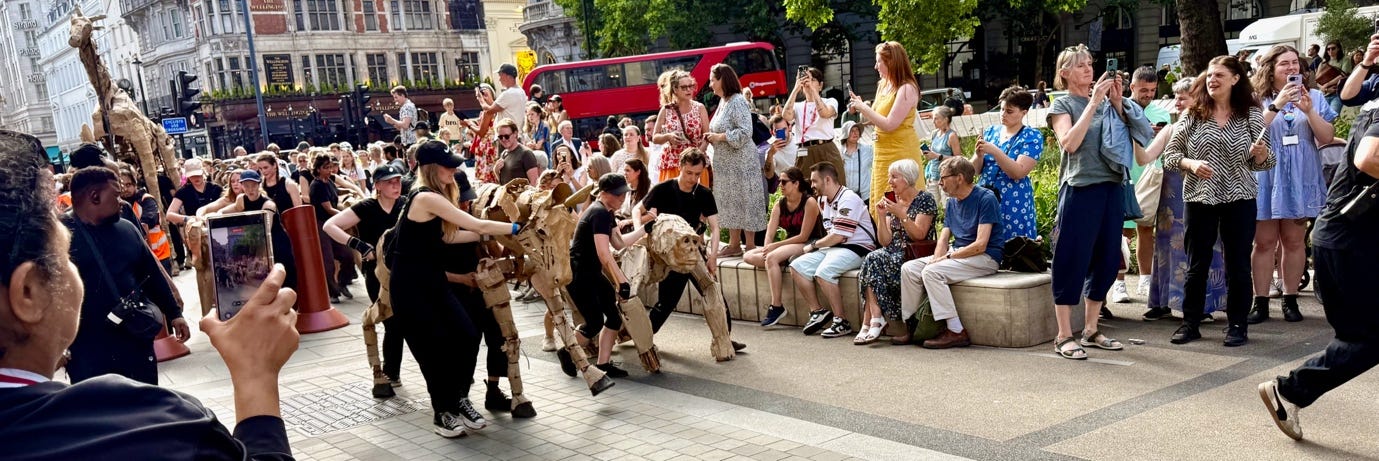
Finally, how can we think the unthinkable?
So, at least this week, Lenin proved to have been spot on. For my part, though, London Climate Action Week 2025 has left me determined to do several things simultaneously:
1. To try even harder to “think the unthinkable,” a term used by one of my first-ever clients (Herman Kahn, a fact I mentioned in my session with Nick Nuttall at the Climate Cocktails Club event) and, more recently, also promoted by Nick Gowing, who I have known for some years—and who kindly took part in our “Big Picture” session.
2. To better understand the nature and scale of the coming Reset—and to communicate its direction and implications more persuasively to the audiences that I address in the coming months and (hopefully) years. A key part of that task must involve ensuring that Volans is well positioned for what comes next. At the same time, I see a key task as helping younger people determined to become effective champions of change—and learning from them in an ongoing process of reverse mentoring.
3. To dive deeper into the emerging worlds of science and technology—and to help, as my newly acquired red cap boldly declares, “Make Science Great Again.” Scientists around the world badly need our help.
4. To better understand the burgeoning London regeneration ecosystem evolving solutions to our grand challenges in areas like climate and biodiversity loss—and to serve as a more effective ambassador for that ecosystem in the wider world.
5. And, by no means finally, to learn from the likes of Mary Robinson about how to become an effective “sustainability elder”—as long as it doesn’t involve too much dancing. This is a role I am being poked towards, whatever my inclinations. As it happens, Lenin died at 53. For better or worse, he was a changemaker. Now 76, and tempting fate sorely, I feel as if I am only just getting started in the business of driving the truly systemic change now required of us.
If you would like to keep tabs on our efforts to climb such learning curves, possible routes include tracking the Volans website, ditto my personal websites (Countercurrent and JohnElkington.com), and signing up for our July 15th Sustainability At A Crossroads webinar, where we are working alongside GlobeScan and the ERM Sustainability Institute.
Thanks for reading this—if you got this far—and do let me know what you think.

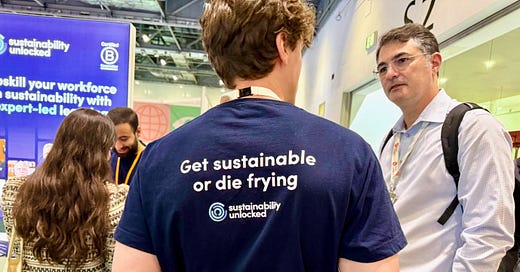






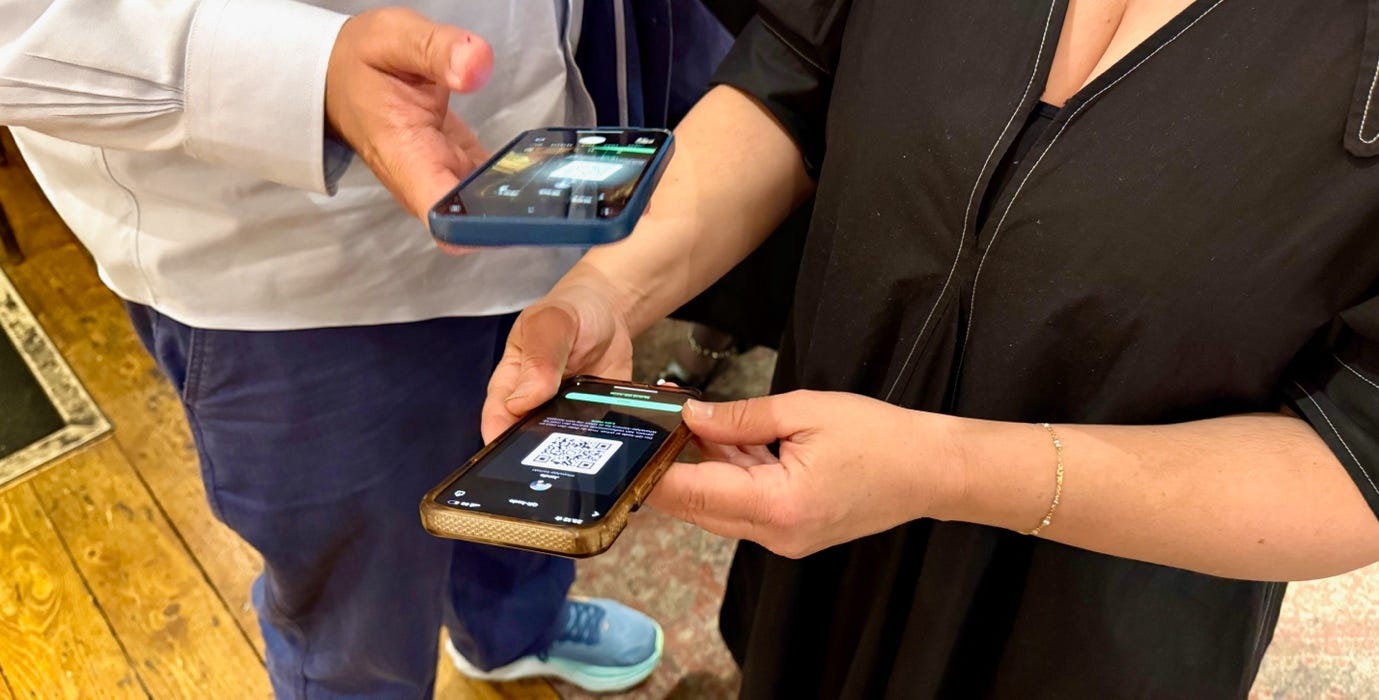
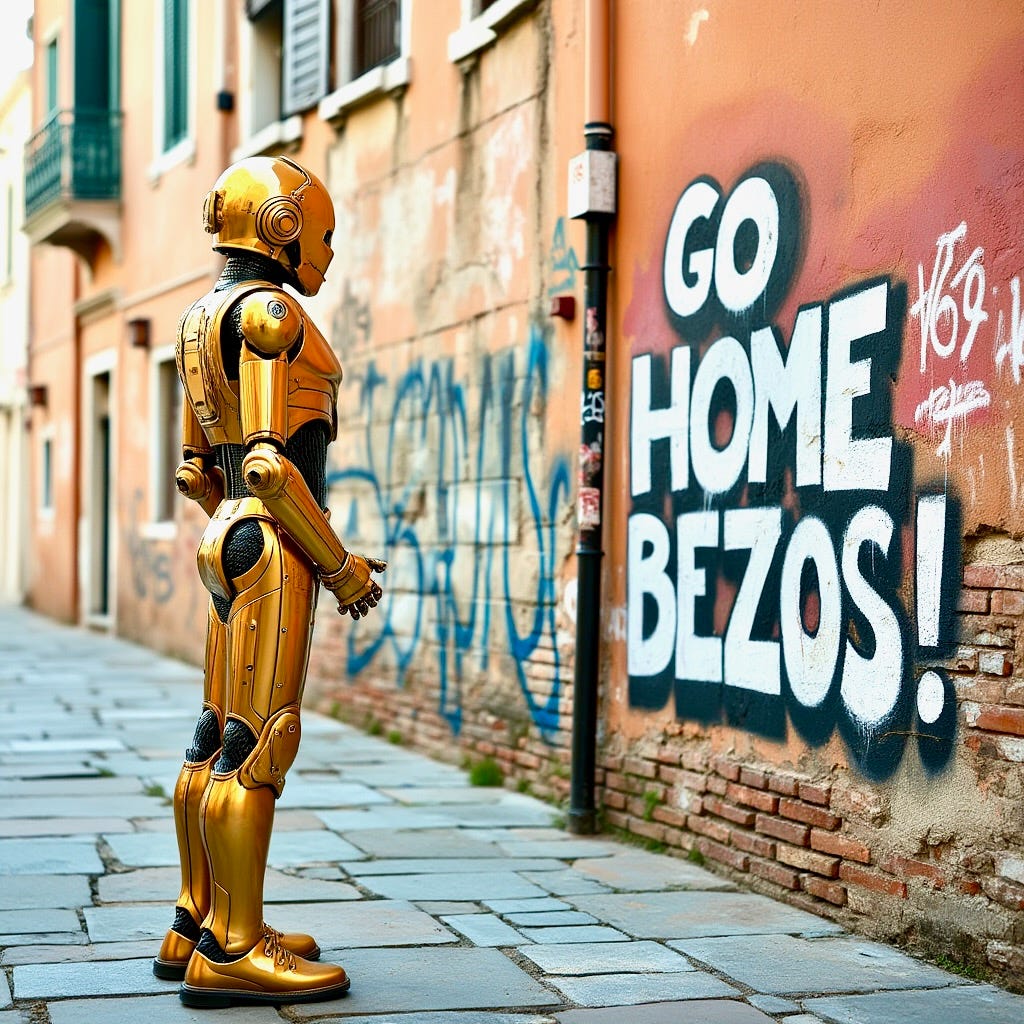



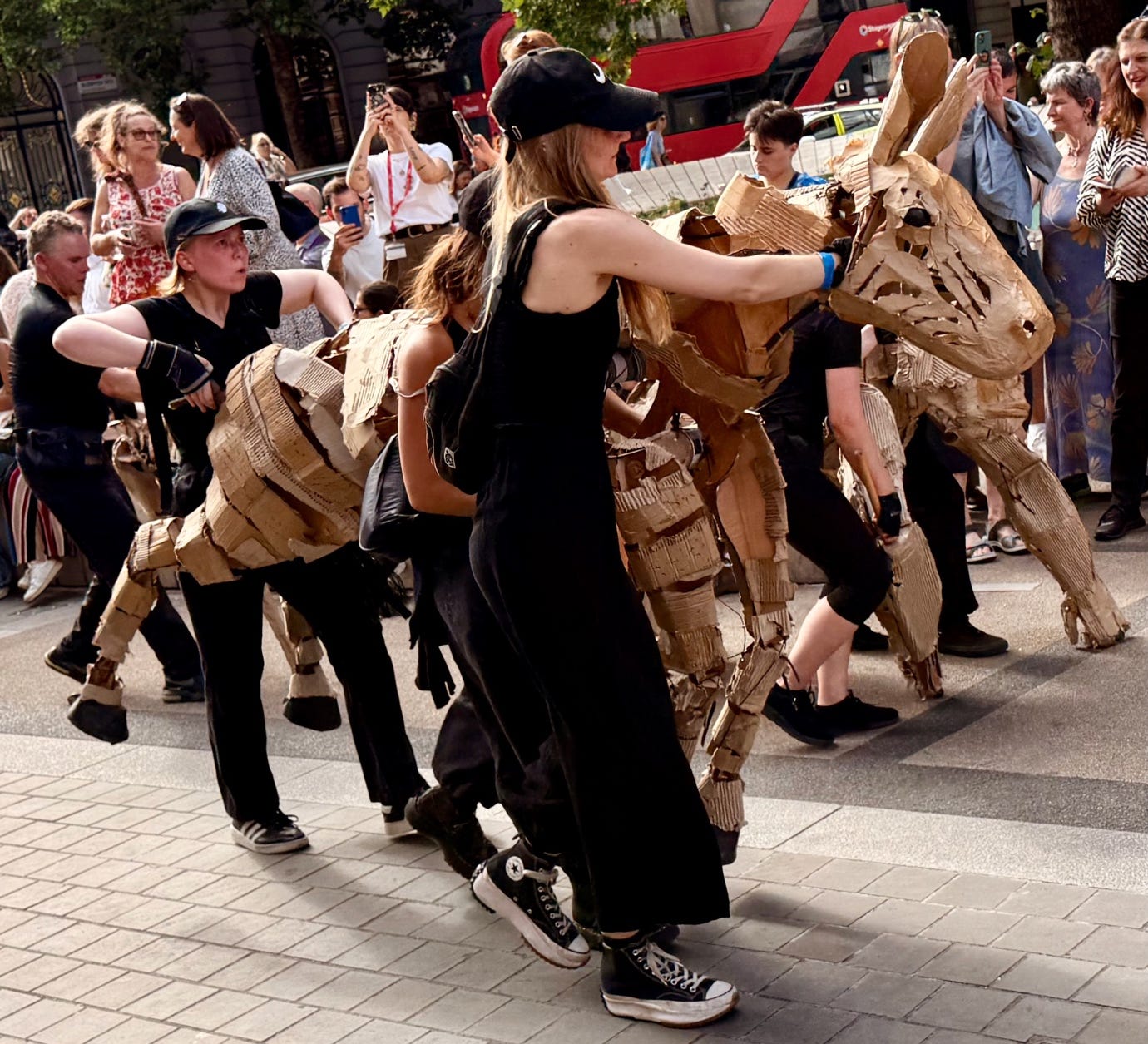
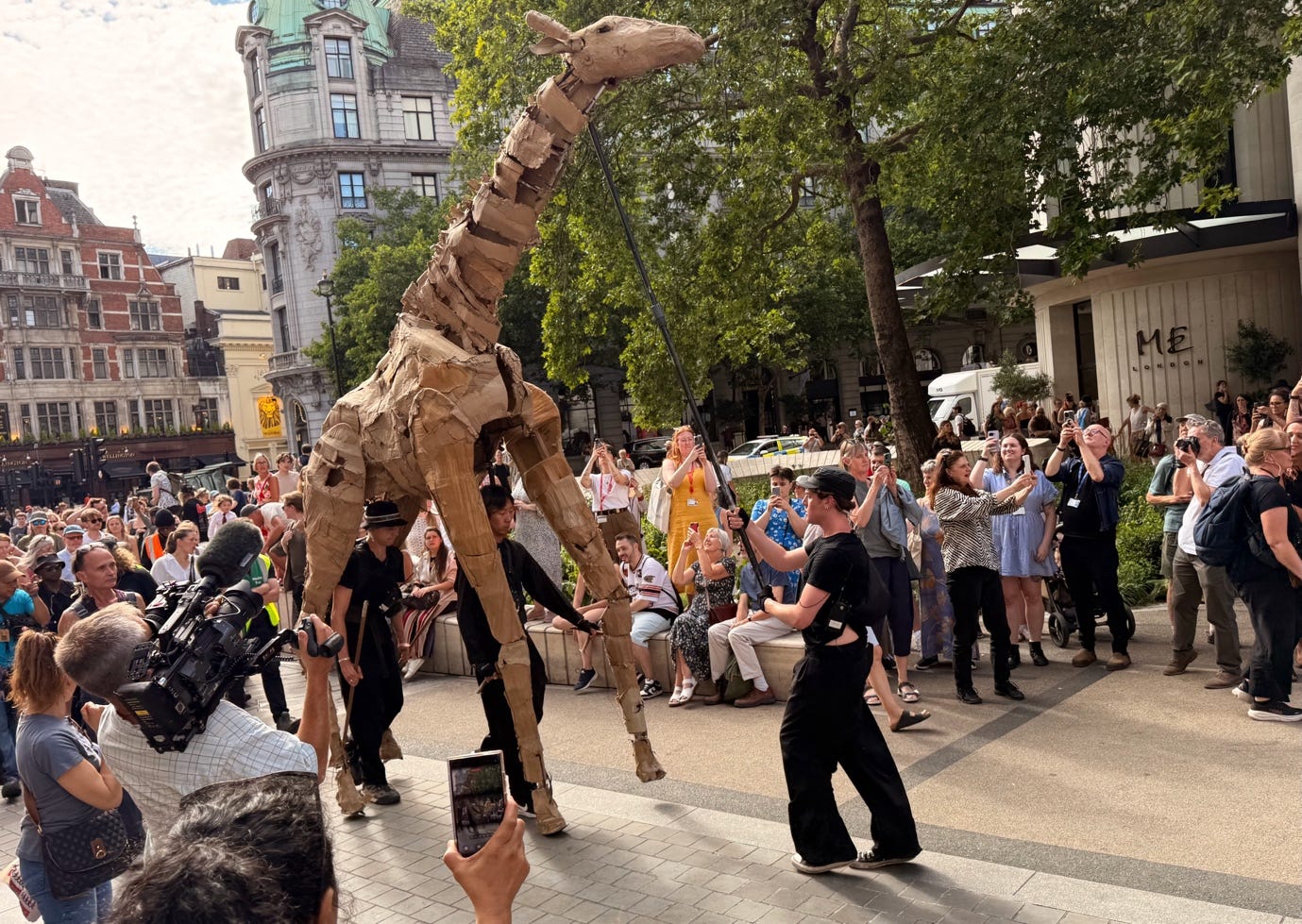
Thanks John. Initially, I fell fairly squarely into your "56%" of respondents - but believe there is so much we can re-compost and grow from the energy and efforts of our creaking, 'old' sustainability system. (No mud, no lotus, etc...) Creating the fertile ground for others to walk the path sounds like a wonderful pursuit and I'm especially delighted to hear youth will be a core part of it for you. My kids and I will no doubt catch The Herds here in Trondheim in July. How vital a role art and creativity play for our community. God bless, and please keep the posts coming.